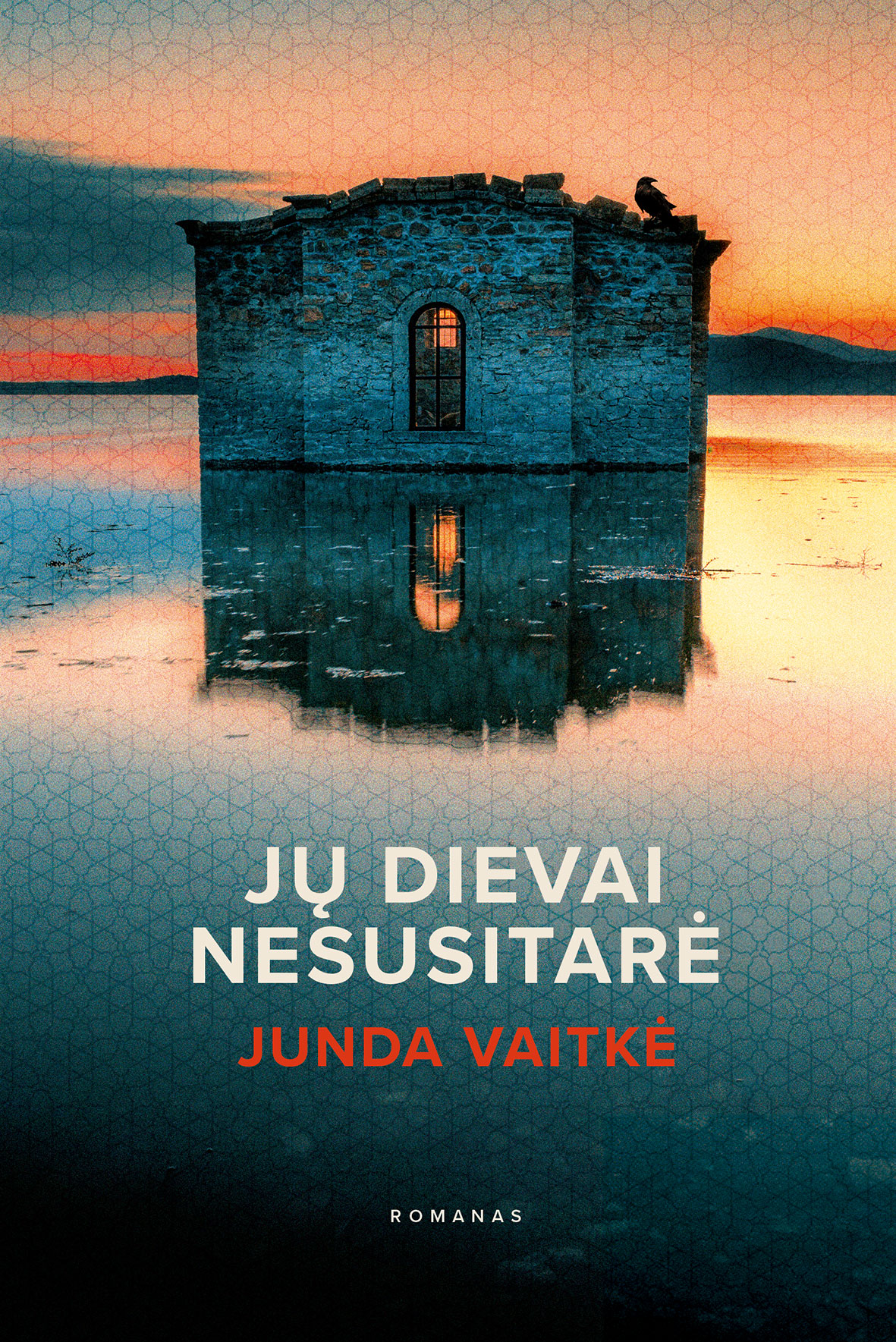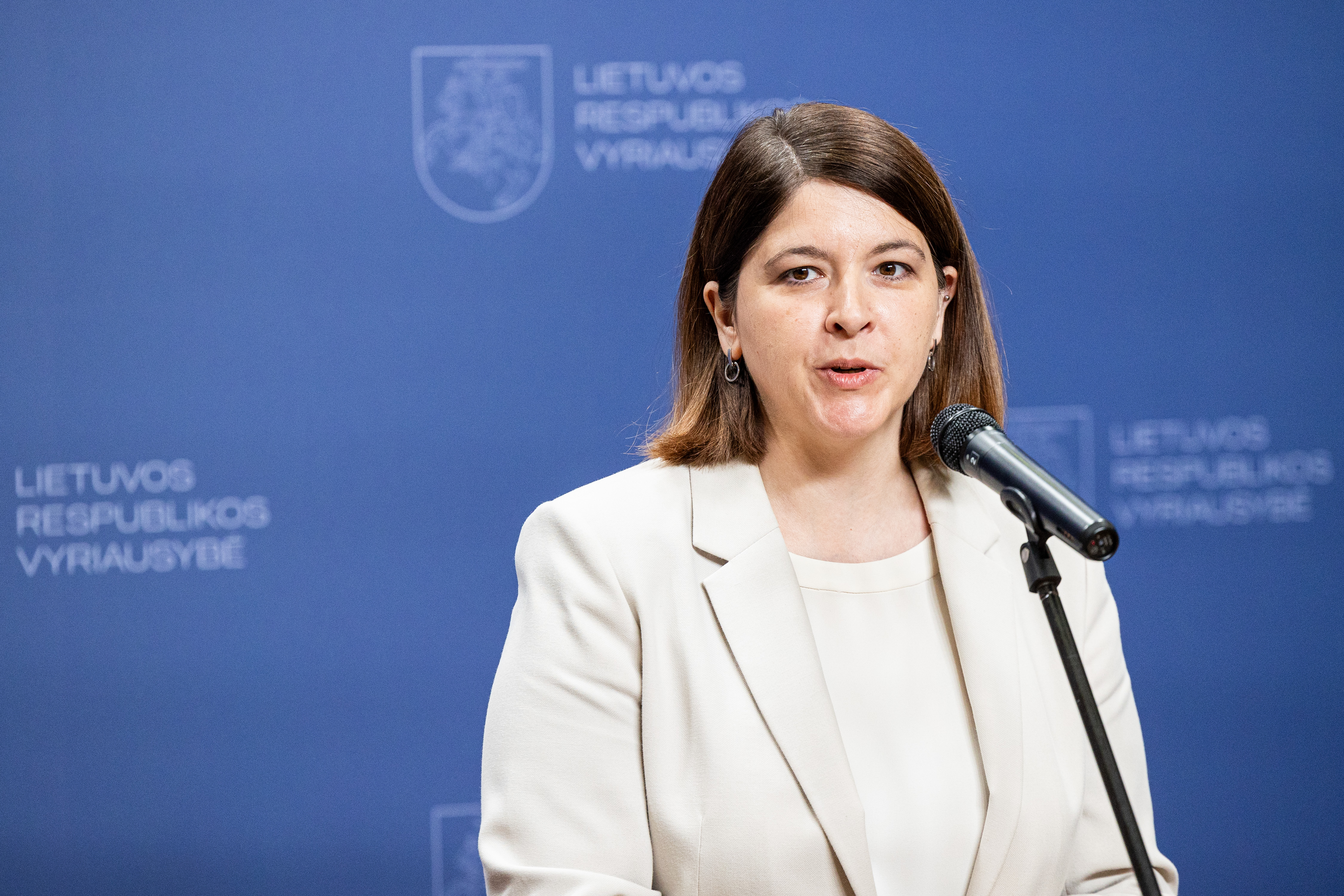about the irreconcilable worlds and the place of man in them

The author not only teaches, but also listens – about the abandoned home, about hope, about lost lives. These experiences have become an inspiration for the new novel « Their Gods has not agreed », published by the Lithuanian Writers' Union publishing house, telling about the efforts of refugee from Afghanistan to remain in foreign land. This book is not only a tension full of the love story of the Afghan and the Lithuanian, but also a deep look at how the differences between cultures and our own stereotypes can form human destiny.
The author tells the story of identity, human strength, determination and forgiveness, showing how our inner worlds meet if we give ourselves the opportunity to get to know another.
– How was « their gods not agreed » the idea? Was it a specific source of inspiration? Do you know the reality of such atef and Mary?
– I am an English lecturer in Ireland, I have been teaching people from all over the world for seventeen years. I live in Monachan County, Monachan itself. It is the capital of this county. Initially, Lithuanians, Latvians, Poles came to the lectures, but after the start of Asia, the African population from their countries began to teach not free Europeans but asylum seekers. People who arrive without any documents. Atef I write about is a real person. Of course, there are a lot of my interpretation in the book.
This work is not just about English, you have to get to know these people closer. I think that I get a psychological education help to get closer to them. After all, men from those lands first do not understand why a teacher is a woman, but as bolder even asks why they will not be taught by a man. While working with refugees from Africa, I saw everything – battles and murders, but as time goes on to the foundation and kindness, warmth, sincerity … How these people love their children, how they miss the abandoned home and homeland. Of all these experiences, the idea of a book related to how my own stereotypes have disappeared (and we all, only a sincere person can say that they do not comply with any standards).
I was interested in a few things in Afghanistan. First of all, because of the fear between Lithuanians and Afghans, and sometimes even hostility from the time when our Lithuanian men were sent to Afghanistan to war. In addition, working with Afghan groups and exploring these people, I also notice a relationship. At first, to hear the statement, « I won't sit at the terrorist! » And a few months later you see a black -talked cafe. It's natural.
Photo by publisher
– Is the road a refugee who entered the Immigration Center in Ireland, as you tell the book?
– This system I tell about actually exists. It was only earlier that it was even more stricter than it is now. Atef arrives, say, but could be any other immigrant). He, of course, has his own imagination of what he will do, which he will turn on, but realizes that it will be a very long process. The first interview, later checking of the checks, photos. The system will try to identify the personality. Only a person who is looking for asylum is surrendered to the hands of the immigration service. Then it enters one or another town.
As described in the novel, this is how the system looks really, and from this system people come to our lessons. Therefore, we hear a variety of stories – we see a lot of pain, anger, longing, despair …
– You depict Atef in a completely different way than stereotypically, Lithuanians imagine a Muslim. Was it aimed to deny certain stereotypes?
– I am very wondering what Atef will look like for readers. I did not say it, but I really did not hurry. I tried to depict it objectively. After all, such people who come to Europe also go through hell. He comes from a completely different country where he was, perhaps known – maybe had a business, maybe four wives, or looked at all from above. When you come here, there is a tiny room of the refugee center and wait for grace, which can take three, four or even ten years … until it naturalize it. Not anyone can survive in these circumstances, often getting into alcohol. I also wanted to show the pain of that person, tell what he was facing. After all, the Atef may have been degraded, but it did not happen, which required infinitely will.
Mary also breaks her own stereotypes. In the novel, it is portrayed as a sensitive and sincere personality. Yes, she can no longer escape from her feelings, but she feels very guilty. Like many Europeans who have read about life with Muslim. Let's be open: thinks you will marry and close it somewhere. Of course, there are such stories as well. There is everything. However, it cannot be absolute. I wonder what readers will see. There will also be people who, after hearing the theme of the work, will immediately refuse to read. There are already any.
– You say there were those who do not want to read a book simply because you write about refugees in Afghanists?
– In fact, I received such reviews as soon as I started writing a book. My first book, Emigrants, was very popular and popular with readers, so people started asking what I was writing about now. When I told me, it was often surprised and said, « Oh, I won't read such a book. »
Again, stereotypes work. Are you from Africa? You are black, lazy, frightening. Do you live in America? You are overweight, you are completely blunt. How easy it is to live like this – I divide everyone into the drawers and do not go deep into what really lies inside the person. I think this book will cause a variety of discussions.
I checked all the historical facts. I tried to avoid inaccuracies to prevent those who were in Afghanistan, « You, Mrs., did not miss at all. »
– In the book you mention a lot of terms, you seem to be well aware of Afghan customs, traditional dishes. Probably you have learned to look at the culture of this region as well?
– I was interested in myself, I read a lot, I listened to different studies, but the Afghan women themselves told a lot, coming to talk and communicate. When they get upset, they are very keen to share their culture, traditions, and life issues. As I can connect with different people, I eventually get closer to them, and then, look, I make something and tell me about traditional dishes, what and how it cooks. It also greatly appreciates my national costume, often wearing them, and then I naturally start asking about it. I am very curious.
Of course, when I write a book, I checked all historical facts. I tried to avoid inaccuracies to prevent those who were in Afghanistan, « You, Mrs., did not miss at all. » Therefore, I chose to write about the village of Atef as a child's gaze. I wanted to show why the Atef grew up as it grew up. What he saw, how he was educated, nourished. If the child's narrative is a bit inaccurate, it is natural and forgiving.
I wish that this book is not viewed only as a love affair. Yes, there are a lot of love and passion, but not only. After all, this book contains a lot of Afghan history.
– Due to religion, the ATEF is unable to make important decisions on its own, and much is not allowed to make it. Do you think religion is more likely to serve as a moral compass, or as a means of controlling people's lives?
– It is about Afghans as far as I have encountered, but I think religion is a moral compass. They are holy what Alach wants, so they do not check the facts. We Europeans tend to verify facts and raise logical questions. Afghanists do not get upset. What they get, carry on and keep it a great value. In addition, the honor of the family is very important to them.
– The love of Atef and Mary is true feelings or more safe refuge search?
– It depends on the reader's interpretation. In general, it is very difficult to describe what is that love? Of course, it is possible to consider if the Mary's family was harmonious and the man provided security, she probably would not have drawn attention to the Atef. Atef himself did not lack the attention of women, but why exactly Mary? Not sure. I think it's true love.
When we try to examine any beautiful, pure feeling with logic, nothing left out of beauty. This can be compared to the rose ring – you will break through the leaf and beauty will disappear. Also with love. If you are nodding and trying to explain all the details, you think, « Maybe there was no real feeling here? » Therefore, I suggest you look at the whole.
– The feelings of the protagonists are more of a choice or inevitability?
– In this case, inevitability. Neither Mary nor Atef could choose and no one was easy, but that true, passionate love is usually unhappy. Of course, one can think, or maybe it would have been possible to save that connection. But what of that? He would be despised by his compatriots and she would be her family.
– It is said that love has no borders, but what about cultural differences? Are they just a barrier to people, or is they still an essential part of identity, a wall that is impossible to overcome?
– This book is conveyed by a message that love still has walls. Of course, one can consider that something more could be done, but … Sometimes the relationship just fails. Sometimes the veins flow too different blood, and the temperaments of humans are too different. Initially, the otherness of the partner usually attracts the otherness, but when the household begins, things usually become much more complicated. House is not just flowers and dating. There are many issues that need to be discussed – what language children will speak, what traditions will cherish and more.
– What was the biggest challenge in creating two different but attracting personalities?
– Because Atef exists actually (of course, I put it in the book), and there are many such Mary. Therefore, it was very important that the Atef remains Afghan as it is a radical faith. Latvian, Polish and any European in general, can be located in Mary. Therefore, in the book, the nationality of Mary is not essential.
By the way, this time, unlike the first novel, I chose to tell a third person. The biggest challenges arise when telling the first person. I wouldn't say that when writing « their gods did not agree » there were any challenges. It was very interesting to write, especially about the village where the Atef grew up.
– Was writing about the village you never visited was a challenge?
– I already received reviews that readers felt smelling and heard sounds and saw the images I created when describing the village. Such was my goal – to convey a slow presence there. Nothing seems to happen, but very much is happening. I think the writer must be like an actor and tame the characters as much as possible. Otherwise, nothing will be conveyed, the more feelings and experiences will be conveyed.
– What did the writing process look like – did you have a clear plan, or did you allow history to develop naturally?
– I had a skeleton and already started writing, I knew what the story would end, but I didn't know where and what the room would be in this frame. Some writers determine exactly how many pages a day must write. Oh, I think, how is it possible? How can you determine how much you write today or tomorrow? Perhaps no image is rising today … I create images.
When writing this book, I had to empathize very well. I walked around the forest for a long time. Walking, walking, walking … Behold, I feel smelling! I see the image! You need to write it down as soon as possible. In addition, this book is significantly shortened – as many as 100 pages.
– Would someone turn differently if those 100 pages had survived?
– The novel would not have ended differently, but you would have read even more rural images, even more of Atef's and Mary's determinations. The end would not have changed. If this is the end …
– In fact, this story has a lot of potential to be extended, with many unanswered questions left. Maybe we'll get a sequel?
– Let's leave the intrigue. Maybe it's not the end of history.
– What essential message do you want to convey to readers?
– The essence of this book is the inner strength. Despite the situation in what situation, it is important to preserve your self and inner strength. For example, the inner strength of Atef. It's not just about family and homeland respect. Whatever the hard path he had to go, he did not burn, did not give up. I think Mary also maintained her inner strength. She did not give up the Atef immediately and showed some such principles. Both heroes of the book remained strong. Inner strength is one of the most important values. Everyone should take care of how to grow it and how to pass it on to their children.







